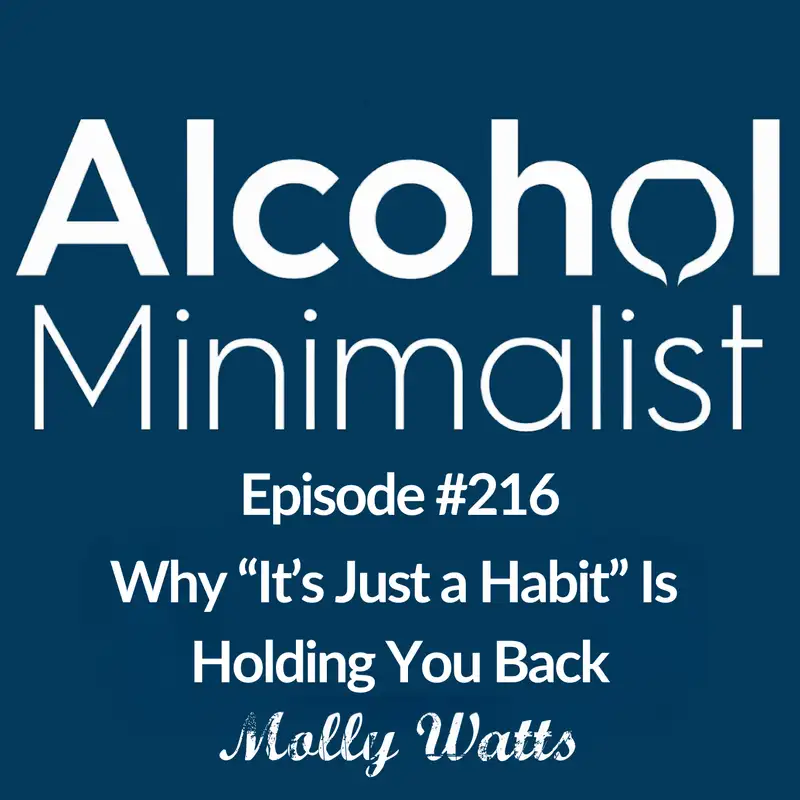Why "It's Just a Habit" is Holding You Back
Episode Summary:
In this episode of The Alcohol Minimalist Podcast, Molly Watts unpacks a common misconception that keeps people stuck in their drinking habits: the belief that “It’s just a habit.” While it may seem like a harmless or even helpful perspective, this thought can actually prevent meaningful change.
Molly discusses how drinking is not just a habit like brushing your teeth—it’s often an emotional response to deeper triggers. She explores how shifting your mindset from breaking a habit to addressing the underlying thoughts and emotions can lead to lasting, sustainable change.
If you’ve ever said to yourself, “My drinking is just a habit,” this episode is a must-listen. Tune in as Molly helps you reframe your relationship with alcohol and move toward a more peaceful, intentional way of drinking.
What You’ll Learn in This Episode:
✅ Why the phrase “It’s just a habit” can actually keep you stuck
✅ The difference between habits and emotional triggers related to drinking
✅ How your thoughts create feelings, which then drive your desire to drink
✅ Why focusing only on breaking the pattern (e.g., swapping a drink for tea) isn’t enough
✅ How shifting your perspective can lead to sustainable change
✅ The difference between habits and emotional triggers related to drinking
✅ How your thoughts create feelings, which then drive your desire to drink
✅ Why focusing only on breaking the pattern (e.g., swapping a drink for tea) isn’t enough
✅ How shifting your perspective can lead to sustainable change
Key Takeaways:
🔹 Drinking isn’t just about routine; it’s driven by thoughts and emotions.
🔹 If you only focus on breaking the drinking habit (e.g., changing your routine), you’re missing the deeper cause.
🔹 The key to sustainable change is addressing the why behind your drinking.
🔹 Creating a peaceful relationship with alcohol requires looking beyond actions to thoughts and emotions.
👉 If you found this episode helpful, please subscribe and leave a review!
Low risk drinking guidelines from the NIAAA:
🔹 If you only focus on breaking the drinking habit (e.g., changing your routine), you’re missing the deeper cause.
🔹 The key to sustainable change is addressing the why behind your drinking.
🔹 Creating a peaceful relationship with alcohol requires looking beyond actions to thoughts and emotions.
👉 If you found this episode helpful, please subscribe and leave a review!
Low risk drinking guidelines from the NIAAA:
Healthy men under 65:
No more than 4 drinks in one day and no more than 14 drinks per week.
Healthy women (all ages) and healthy men 65 and older:
No more than 3 drinks in one day and no more than 7 drinks per week.
No more than 3 drinks in one day and no more than 7 drinks per week.
One drink is defined as 12 ounces of beer, 5 ounces of wine, or 1.5 ounces of 80-proof liquor. So remember that a mixed drink or full glass of wine are probably more than one drink.
Abstinence from alcohol
Abstinence from alcohol is the best choice for people who take medication(s) that interact with alcohol, have health conditions that could be exacerbated by alcohol (e.g. liver disease), are pregnant or may become pregnant or have had a problem with alcohol or another substance in the past.
Abstinence from alcohol is the best choice for people who take medication(s) that interact with alcohol, have health conditions that could be exacerbated by alcohol (e.g. liver disease), are pregnant or may become pregnant or have had a problem with alcohol or another substance in the past.
Benefits of “low-risk” drinking
Following these guidelines reduces the risk of health problems such as cancer, liver disease, reduced immunity, ulcers, sleep problems, complications of existing conditions, and more. It also reduces the risk of depression, social problems, and difficulties at school or work.
Following these guidelines reduces the risk of health problems such as cancer, liver disease, reduced immunity, ulcers, sleep problems, complications of existing conditions, and more. It also reduces the risk of depression, social problems, and difficulties at school or work.

